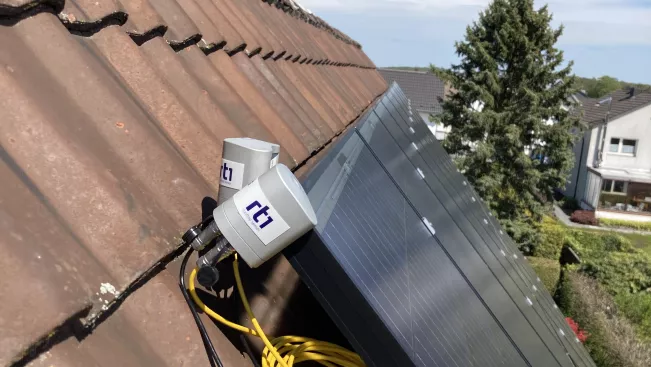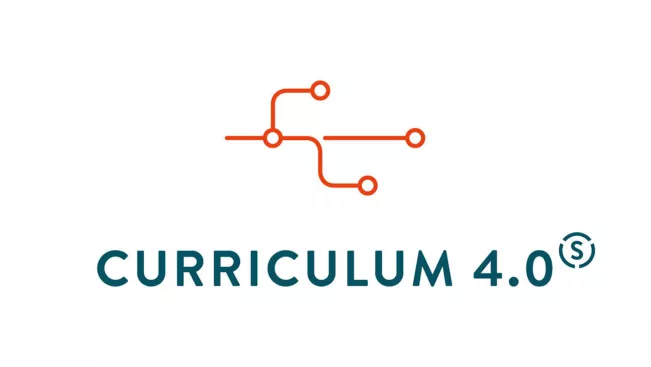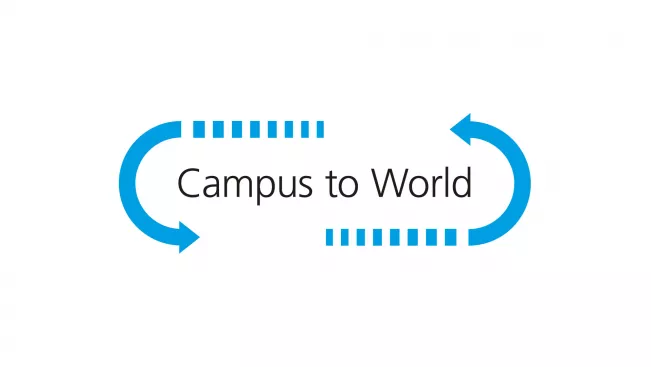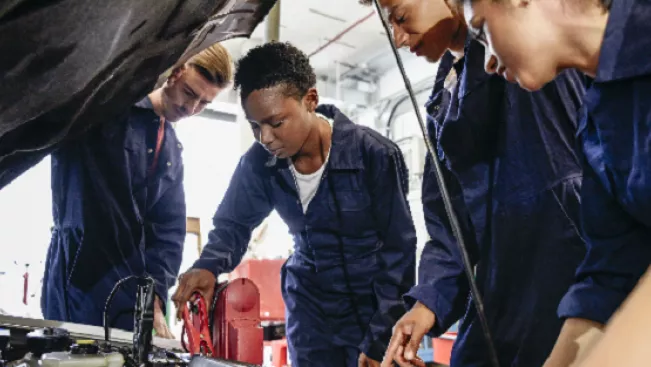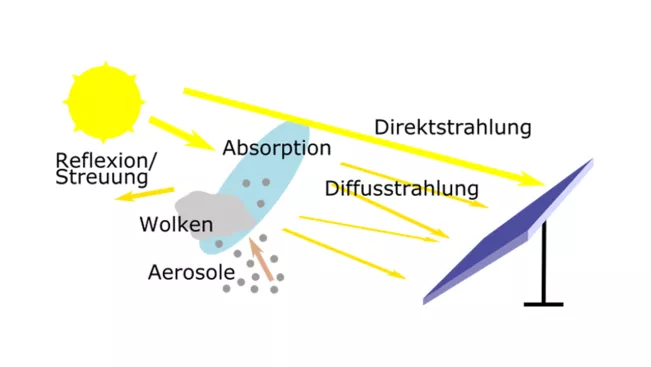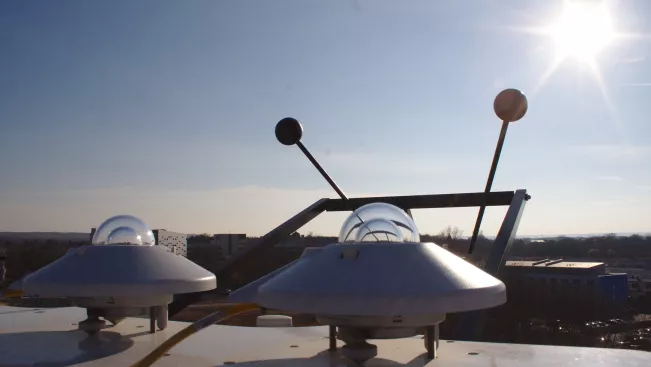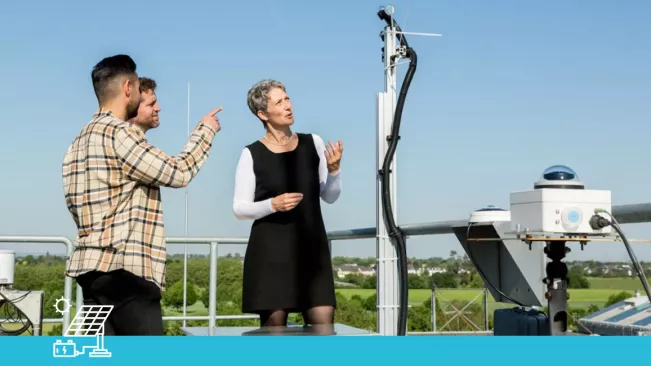International Centre for Sustainable Development (IZNE)

Prof. Dr Stefanie Meilinger
Professor for Sustainable Technologies, esp. Energy Efficiency and Renewable Energies/Director of the International Centre for Sustainable Development (IZNE)/Department Engineering and Communication (IWK)
Unit
Department of Engineering and Communication, Institute of Technology, Resource and Energy-efficient Engineering (TREE), International Centre for Sustainable Development (IZNE)
Research fields
- Sustainable Technologies, especially Renewable Energies and Energy Efficiency
Location
Sankt Augustin
Room
F 321
Address
Grantham-Allee 20
53757 Sankt Augustin
Telephone
+49 2241 865 718Profile
Field of teaching: Courses of Prof. Meilinger
Areas of research:
- Sustainable energy systems
- Sustainable Mobility
- Sustainability of technological transformation processes
Laboratory: Energy Meteorology Laboratory
Curriculum vitae
Professional activity:
Since 06/2013 International Center for Sustainable Development (IZNE), H-BRS
Professor for Sustainable Technologies,
especially renewable energies and energy efficiency
09/2012 – 05/2013 German Meteorological Service
Research assistant
02/2008 – 07/2012 Lufthansa Systems AG
Specialist and Product Manager for Environmental Flight Planning
01/2004 – 01/2008 Environmental Ressource Management GmbH (ERM)
Consultant Energy and Climate Protection
01/1997 – 01/2004 Max Planck Institute for Chemistry (Department of Air Chemistry)
Research assistant
04/1996 – 12/1996 Institute for Technology Assessment and Systems Analysis
Research assistant
School, study and doctorate:
01/1997 – 08/2000 Doctorate (Dr.sci.nat.) in environmental sciences
at the ETH Zurich in cooperation with the MPI for Chemistry in Mainz
Subject: „Heterogeneous Chemistry in the Tropopause Region: Impact of Aircraft Emissions
10/1989 – 11/1995 Study of Physics
Johannes Gutenberg University Mainz
11/1995 Diploma (very good)
Subject: „Non-Equilibrium Liquid Stratospheric Aerosol“
10/1990 – 04/1995 Study of Philosophy
Johannes Gutenberg University Mainz
08/1992 – 08/1993 Study at the Indiana University Bloomington, USA
05/1989 Baccalaureate
1980 - 1989 Marienschule Limburg/Lahn
1976 - 1980 Grund- und Hauptschule Oberbrechen
Memberships
- UNEP Life Cycle Initiative (Biogenic Carbon Project)
- VID (Richtlinienausschuss VDI 4635 Power-to-X)
- DMG (FA Energiemeteorologie)
- DPG (AG Energie)
- Forschungsnetzwerk Wasserstoff
- HyCologen
- PtX Hub
- SDSN Germany
- promet (Redaktionsaussschuss)
Research Projects
The GREATER project aims at supporting Rwandan country in the energy transition which is needed for sustaining its social and economic growth. In order to fill the energy gap and to enable equal access of the Rwandan population to electricity, widespread exploitation of renewable energy sources is planned. According to Governmental strategies for energy development, low-power, off-grid, distributed power generation will play a key role, this calling for both the training of a new generation of skilled professionals and for the widest diffusion of green awareness in the national community.
Project management at the H-BRS
Prof. Dr Marco Jung Prof. Dr Stefanie Meilinger Prof. Dr Tanja Clees Derk GonschorThe reTURN project partners are stepping up to revolutionize the transportation sector through sector coupling and to demonstrate a process for producing climate-friendly synthetic fuels at a viable cost.
Project management at the H-BRS
Prof. Dr Stefanie MeilingerIn this project, the Bonn-Rhein-Sieg University of Applied Sciences will analyse the availability of brewer's grains and the sustainability of procurement and processing. The design of a suitable electrochemical electrolysis cell will be carried out at Robert Gordon University.
Project management at the H-BRS
Prof. Dr Tanja Clees Prof. Dr Stefanie MeilingerThe KLUGER Transfer project stands for knowledge transfer in the fields of climate, environment and health research. The aim is to strengthen the transfer of knowledge from basic research at the Max Planck Institute for Chemistry (MPIC) via applied research at the International Center for Sustainable Development (IZNE) at Bonn-Rhein-Sieg University of Applied Sciences (H-BRS) to the public, politics and business. Different formats for targeted exchange are being tested in order to improve communication between science, society and politics.
Project management at the H-BRS
Prof. Dr Katja Bender Prof. Dr Martin Hamer Prof. Dr Stefanie Meilinger Prof. Dr Wiltrud TerlauThe aim of the project is the development of high-quality, lightweight structural components for the mobility sector, and the respective manufacturing technologies. To achieve this goal, a modular system for hybrid fiber composite lightweight components in the commercial vehicle sector is further developed and transferred to the rail vehicle sector. The lightweight components allow a significant weight reduction compared to the reference structures. Additionally, new manufacturing technologies are employed that require significantly lower energy input. As a result, a considerable amount of CO2 is saved both during production and throughout the service life phase.
Project management at the H-BRS
Prof. Dr Stefanie MeilingerIn Germany, photovoltaic (PV) systems are increasingly being combined with battery storage systems to enhance self-consumption and relieve the electricity grids of weather-related power peaks. Predictions of solar radiation and expected PV power generation are prerequisites for an optimal battery charging strategy. In the PV-Sp project, a feasibility study is conducted exploring whether a radiation map can be created based on the PV yields of PV battery systems, leading to an improvement of PV power predictions.
Project management at the H-BRS
Prof. Dr Stefanie MeilingerThe potentials and effects of digitalisation today encompass all areas of human and social activity. Universities are therefore responsible for enabling their students to develop competences that not only include the competent use of digital technologies, but also the ability to assess the potential and effects of digitisation in society and the world of work, to actively and reflexively shape digitisation processes and to keep pace with the rapid dynamics of change. In 2019/2020, the state of North Rhine-Westphalia developed the Curriculum 4.0.nrw funding line, which is intended to support the Hochschule Bonn-Rhein-Sieg in exploiting the opportunities of digital teaching, among other things. In the Department of Electrical Engineering, Mechanical Engineering and Technical Journalism, this funding line will be used to further develop the Master's programme in Sustainable Engineering Sciences, which addresses the funding line's thematic areas such as technical innovation and digitalisation.
Project management at the H-BRS
Prof. Dr Marco Jung"Dumsor" is the Ghanaian word for the frequent blackouts that happen on the country's electricity grid. Like many developing and emerging countries, Ghana suffers from frequent power cuts. On top of this, there is also the instability of the power grid. Both have a major impact on the health care services. Although electricity from photovoltaic systems could provide a solution, the photovoltaic (PV) market in Ghana remains relatively underdeveloped. This is where the EnerSHelf joint project steped in. Through dedicated research, research-practice collaboration in interdisciplinary teams, and on-the-ground implementation, the project paved the way for improved energy access and resilience within the healthcare sector, ultimately contributing to the well-being and prosperity of the Ghanaian population.
Project management at the H-BRS
Prof. Dr Stefanie Meilinger Prof. Dr Katja BenderThe institute TREE operates the TREE-Energy Lab (TRE3L) in the university's Center of Applied Research (ZAF) with it's industrial partners GKN Driveline and GKN Sinter Metals. In the three sub-labs Powder Fabrication-Lab, Mobility-Lab and Hydrogen-Lab the three partners work on innovative techniques in powder metallurgy and recent topics of environment friendly mobility and energy-efficiency. These labs are supported by a Simulation-Lab.
Project management at the H-BRS
Prof. Dr Alexander Asteroth Prof. Dr Tanja Clees Prof. Dr Dirk ReithBonn-Rhein-Sieg University of Applied Sciences has adapted its existing transfer instruments to the changing demands and requirements of business and needs of business, society and science and developed new suitable transfer mechanisms. The project was funded by the federal-state initiative "Innovative University".
Research project for the (further) development of innovative energy meteorological methods for satellite-based forecasts of irradiation and PV power at plant level.
Project management at the H-BRS
Prof. Dr Stefanie MeilingerThe development of sustainable electromobility is one of the social challenges our time, which is considered in the research project eTa. The energy efficiency of vehicles is addressed in aerodynamic projects and optimized operating strategies. In particular, non-classic vehicle concepts are in focus. Alternative mobility concepts based on non-fossil fuels need new supply structures. The optimized expansion of the loading infrastructure is therefore another issue. But even the best mobility concept is useless if it is not accepted by society and implemented by politics and business. Therefore, acceptance questions are a central element of eTa, which will be further developed. The following areas are addressed primarily by the need to reduce energy consumption: Efficiency of the vehicles Alternative mobility concepts Efficiency of mobility concepts Technical acceptance In particular, these are questions which arise only from the combined consideration of these subject areas and are usually not fully answered in classical manner. Examples of this are optimization of hybrid controls for muscle-electric hybrid light vehicles and study of the aerodynamics of ultralight vehicles where results of the classic wind tunnel tests often do not correspond to the results of the practice. Other topics that we are dealing with are predictive operational strategies for electric combustion hybrid vehicles and loss optimization, optimization of multi-stage placement of charging stations, acceptance of alternative mobility concepts.
Project management at the H-BRS
Prof. Dr Alexander AsterothWithin the framework of the NRW-Ghana Partnership and the funding program "NRW-Partnerships for the Promotion of Technical Universities in Ghana", the Ministry of Innovation, Economy and Research (MIWF) has been funding the university partnership project "Partnership for Applied Sciences - PASS" between the Bonn-Rhein-Sieg University of Applied Sciences (consortium leader), the Cologne University of Applied Sciences, the International University of Applied Sciences Bad Honnef and the two Ghanaian universities Kumasi Technical University and Cape Coast Technical University through the German Academic Exchange Service (DAAD) since 2017.
As part of the NRW-Ghana Partnership and the funding programme "NRW Partnerships for the Promotion of Technical Universities in Ghana", the Ministry of Innovation, Economics and Research (MIWF) has been funding the university partnership project "Partnership for Applied Sciences - PASS" between Hochschule Bonn-Rhein-Sieg University of Applied Sciences (consortium leader), Cologne University of Applied Sciences, Bad Honnef International University of Applied Sciences and the two Ghanaian universities Kumasi Technical University and Cape Coast Technical University through the German Academic Exchange Service (DAAD) since 2017. The project has a duration of four years.
The main objectives of the definition project "Energy Self-sufficiency for Health Facilities in Ghana" were to form a consortium of academic and corporate partners to prepare a draft proposal for a research and development (R&D) project aimed primarily at simultaneously improving access to health services and energy through the development and delivery of context-appropriate and sustainable energy solutions for health facilities in Ghana.
Project management at the H-BRS
Prof. Dr Katja Bender Prof. Dr Stefanie MeilingerGlobal energy demand is increasing year by year. On the one hand, this is driven by population growth and, on the other, by the increasing demand for technical equipment, travel/transport and consumer goods.
Project management at the H-BRS
Prof. Dr Stefanie MeilingerThe project is about the idea of a quick retrofit for conventional cars and buses, in order to reduce fuel consumption, related costs and CO2 emissions by using photovoltaic panels on the roof which are connected to the existing vehicle power supply network. This reduces the load on the alternator and leads to a reduction in fuel consumption. Tasks The main task of this project is to find out if the suggested PV system is applicable and profitable particularly with regard to sustainability: Theoretic calculations Experimental tests Analysing the results Impact estimations
Project management at the H-BRS
Prof. Dr Stefanie MeilingerAgainst the backdrop of the concretization of the 2030 Agenda adopted in September and the universally applicable Sustainable Development Goals (SDGs) anchored therein, solution strategies for the greater intensification of interdisciplinary cooperation between different scientific disciplines and the necessary internationalization of research will be developed in a dialogue between representatives of development and sustainability research, research policy and research funding institutions.
Project management at the H-BRS
Prof. Dr Katja BenderIn order to save energy, ergonomic indoor climate control adapted to people's personal preferences is a good way. For this purpose, weather forecast data can be used, personal climate control data from the past, preferences and simulation evaluation data can be included and evaluated. A room model will be developed and simulated that evaluates such data and suggests individualized room climate control.
Project management at the H-BRS
Prof. Dr Stefanie MeilingerThe project is based on the idea of a quick retrofit for conventional cars and buses, in order to reduce fuel consumption, related costs and CO2 emissions by using photovoltaic panels on the roof which are connected to the existing vehicle power supply network. This reduces the load on the alternator and leads to a reduction in fuel consumption. Tasks The main task of this project is to find out if the suggested PV system is fitting sustainability criteria, if it is applicable, effective and profitable.
Project management at the H-BRS
Prof. Dr Stefanie MeilingerDevelopment of a flasher for photovoltaics with capabilities to control intensity, spectral energy density distribution, and angle of incidence for direct site- and time-based yield measurement in the laboratory.
Project management at the H-BRS
Prof. Dr Stefanie Meilinger Prof. Dr Dieter Franke (Professor im Ruhestand)The goal of this project was to develop a strategy in order to extend the infrastructure of car charging stations in Bonn and the Rhein-Sieg-Kreis. Based on goals set by the government and information about the distribution of the car density in the area of interest, scenarios for the extension between 2016 and 2020 have been identified. In order to achieve these goals, the number of charging stations has to be raised successively from 256 (in 2016) to a number of 935 in 2020. Therefore, a grid map for the distribution of charging stations for electronic cars and bicycles had to be created. Also so called "points of interest" (POIs) (tourist attractions, leisure time facilities, etc.) as well as park-and-ride stations have been taken into account. All those options have been ranked according to their priority and their individual traffic data. The current distribution of charging stations has been investigated beforehand. With the help of an algorithm, the best positions and distributions for charging stations have been determined. Though, further analysis is necessary in order to bring these proposals into practise. Therefore, a guildeline has been developed and tested in a workshop for the locations "Königswinter" and "Bonn City Centre".
Project management at the H-BRS
Prof. Dr Stefanie MeilingerPublications
2026
Falmata Abdoulaye Moussa, Ibrahim Halidou, Stefanie Meilinger, Bruno Korgo:
Seasonal Performance Analysis of Monocrystalline and Polycrystalline Photovoltaic Solar Panels Under Dust Deposition in Niamey, Niger.
PDF Download (Early View, CC BY 4.0) doi:10.1002/ese3.70447
BibTeX | RIS
Edward Dodzi Amekah, Emmanuel Wendsongre Ramde, David Ato Quansah, Elvis Twumasi, Stefanie Meilinger, Thorsten Schneiders:
Evaluating the effect of reactive power injection on power factor and system losses reduction in an optimally sized PV grid-connected solar photovoltaic system.
PDF Download (CC BY-NC-ND 4.0) doi:10.1016/j.solcom.2025.100149 urn:nbn:de:hbz:1044-opus-93693
BibTeX | RIS
2025
Frank Dieball, Stefanie Meilinger, Florian Bahl, Philipp Kruppe:
Wissenstransfer für nachhaltige Entwicklung in der ingenieurwissenschaftlichen Hochschullehre: Grundlagenforschung trifft Praxis.
PDF Download (CC BY-SA 4.0) doi:10.3278/HSL2576W urn:nbn:de:hbz:1044-opus-93967
BibTeX | RIS
Katja Bender, Martin Hamer, Stefanie Meilinger, Wiltrud Terlau, Susanne Benner, Alexandra Gutmann, Laura Lelieveld-Fast, Samantha Antonini, Frank Dieball, Angela Turck, Sebastian Heinen:
KLUGER Transfer (Klima-Umwelt-Gesundheit) - Institutionalisierte Transfer-Kooperation zwischen außeruniversitären Forschungseinrichtungen und Hochschulen für Angewandte Wissenschaften.
doi:10.34657/27048
BibTeX | RIS
Paul Matteschk, Max Aragón, Jose Gomez, Jacob K. Thorning, Stefanie Meilinger, Sebastian Houben:
HDR Merging of RAW Exposure Series for All-Sky Cameras: A Comparative Study for Circumsolar Radiometry.
PDF Download (CC BY 4.0) doi:10.3390/jimaging11120442 urn:nbn:de:hbz:1044-opus-93685
BibTeX | RIS
Frank Dieball, Stefanie Meilinger, Philipp Kruppe, Florian Bahl:
Basic Research Meets Engineering Studies: A Design-Based Research Approach.
doi:10.1109/EDUCON62633.2025.11016437
BibTeX | RIS
Steffen Schedler, Michael Bareev-Rudy, Stefanie Meilinger, Tanja Clees:
Application of a Regional Data Set of the Housing Sector for Hydrogen Storage-Supported Energy System Planning.
PDF Download (CC BY 4.0) doi:10.32604/ee.2025.061962 urn:nbn:de:hbz:1044-opus-89950
BibTeX | RIS
Samer Chaaraoui, Stefanie Meilinger, Sebastian Houben, Thorsten Schneiders, Windmanagada Sawadogo:
A Probabilistic Model Predictive Control Approach for PV-Diesel Hybrid Systems in Ghana’s Health Sector Using Seamless State Prediction Methods.
PDF Download (CC BY 4.0) doi:10.1109/ACCESS.2025.3556980 urn:nbn:de:hbz:1044-opus-89663
BibTeX | RIS
2024
Edward Dodzi Amekah, Emmanuel Wendsongre Ramde, David Ato Quansah, Elvis Twumasi, Stefanie Meilinger, Thorsten Schneiders:
Optimal placement and upgrade of solar PV integration in a grid-connected solar photovoltaic system.
PDF Download (CC BY-NC-ND 4.0) doi:10.1016/j.solcom.2024.100099 urn:nbn:de:hbz:1044-opus-87704
BibTeX | RIS
Marion Schroedter-Homscheidt, Jan Dobschinski, Stefan Emeis, Detlev Heinemann, Stefanie Meilinger:
Weather as a driver of the energy transition – present and emerging perspectives of energy meteorology.
PDF Download (CC BY-NC-ND 4.0) doi:10.1063/5.0231754 urn:nbn:de:hbz:1044-opus-87696
BibTeX | RIS
Edward Dodzi Amekah, Emmanuel Wendsongre Ramde, David Ato Quansah, Elvis Twumasi, Stefanie Meilinger, Thorsten Schneiders:
Analyzing the consequences of power factor degradation in grid-connected solar photovoltaic systems.
PDF Download (CC BY-NC-ND 4.0) doi:10.1016/j.prime.2024.100715 urn:nbn:de:hbz:1044-opus-85464
BibTeX | RIS
Frank Dieball, Stefanie Meilinger, Florian Bahl, Philipp Kruppe:
Competence-Enhancing Knowledge Transfer of Basic Research Content: Project-Based Learning in Engineering Studies.
doi:10.1109/EDUCON60312.2024.10578638
BibTeX | RIS
Steffen Schedler, Stefanie Meilinger, Tanja Clees:
A new bottom-up method for classifying a building portfolio by building type, self-sufficiency rate, and access to local grid infrastructure for storage demand analysis.
PDF Download (CC BY 4.0) doi:10.1016/j.apenergy.2024.123502 urn:nbn:de:hbz:1044-opus-84809
BibTeX | RIS
Robert Sausen, Stefanie Meilinger, Johannes Quaas:
Conference on Transport, Atmosphere and Climate (TAC-5).
PDF Download (CC BY 4.0) doi:10.1127/metz/2024/1228 urn:nbn:de:hbz:1044-opus-84723
BibTeX | RIS
Jonas Bauhof, Katja Bender, Stefanie Meilinger, Sarah Rabe:
Inter- and Transdisciplinary Collaboration in an International Research Project – The Case of the German-Ghanaian Project EnerSHelF (Energy-Self-Sufficiency for Health Facilities in Ghana).
PDF Download doi:10.18418/978-3-96043-112-1 urn:nbn:de:hbz:1044-opus-83694
BibTeX | RIS
Windmanagda Sawadogo, Benjamin Fersch, Jan Bliefernicht, Stefanie Meilinger, Thomas Rummler, Seyni Salack, Samuel Guug, Harald Kunstmann:
Evaluation of the WRF-solar model for 72-hour ahead forecasts of global horizontal irradiance in West Africa: A case study for Ghana.
PDF Download (CC BY 4.0) doi:10.1016/j.solener.2024.112413 urn:nbn:de:hbz:1044-opus-79064
BibTeX | RIS
Jonas Witthuhn, Anja Hünerbein, Florian Filipitsch, Stefan Wacker, Stefanie Meilinger, Hartwig Deneke:
Aerosol properties and aerosol–radiation interaction in clear-skies over Germany for the period from 2003 to 2020.
doi:10.1063/5.0184865
BibTeX | RIS
Samer Chaaraoui, Sebastian Houben, Stefanie Meilinger:
Probabilistic end-to-end irradiance forecasting through pre-trained deep learning models using all-sky-images.
PDF Download (CC BY 4.0) doi:10.5194/asr-20-129-2024 urn:nbn:de:hbz:1044-opus-77044
BibTeX | RIS
2023
Windmanagda Sawadogo, Benjamin Fersch, Jan Bliefernicht, Stefanie Meilinger, Harald Kunstmann:
Evaluating the Performance of WRF-Solar Model for 72-Hour Ahead Global Horizontal Irradiance Forecasting in West Africa: A Case Study of Ghana.
PDF Download (Meeting Abstract, CC BY 4.0) doi:10.5194/egusphere-egu23-17484 urn:nbn:de:hbz:1044-opus-76789
BibTeX | RIS
James Barry, Stefanie Meilinger, Klaus Pfeilsticker, Anna Herman-Czezuch, Nicola Kimiaie, Christopher Schirrmeister, Rone Yousif, Tina Buchmann, Johannes Grabenstein, Hartwig Deneke, Jonas Witthuhn, Claudia Emde, Felix Gödde, Bernhard Mayer, Leonhard Scheck, Marion Schroedter-Homscheidt, Philipp Hofbauer, Matthias Struck:
Irradiance and cloud optical properties from solar photovoltaic systems.
PDF Download (CC BY 4.0) doi:10.5194/amt-16-4975-2023 urn:nbn:de:hbz:1044-opus-76204
BibTeX | RIS
Windmanagda Sawadogo, Jan Bliefernicht, Benjamin Fersch, Seyni Salack, Samuel Guug, Belko Diallo, Kehinde.O. Ogunjobi, Guillaume Nacoulma, Michael Tanu, Stefanie Meilinger, Harald Kunstmann:
Hourly global horizontal irradiance over West Africa: A case study of one-year satellite- and reanalysis-derived estimates vs. in situ measurements.
PDF Download (CC BY 4.0) doi:10.1016/j.renene.2023.119066 urn:nbn:de:hbz:1044-opus-74744
BibTeX | RIS
Windmanagda Sawadogo, Jan Bliefernicht, Benjamin Fersch, Seyni Salack, Samuel Guug, Kehinde.O. Ogunjobi, Stefanie Meilinger, Harald Kunstmann:
Global Horizontal Irradiance in West Africa: Evaluation of the WRF-Solar Model in Convection-Permitting Mode with Ground Measurements.
doi:10.1175/JAMC-D-22-0186.1
BibTeX | RIS
James Barry, Stefanie Meilinger, Klaus Pfeilsticker, Anna Herman-Czezuch, Nicola Kimiaie, Christopher Schirrmeister, Rone Yousif, Tina Buchmann, Johannes Grabenstein, Hartwig Deneke, Jonas Witthuhn, Claudia Emde, Felix Gödde, Bernhard Mayer, Leonhard Scheck, Marion Schroedter-Homscheidt, Philipp Hofbauer, Matthias Struck:
Irradiance and cloud optical properties from solar photovoltaic systems.
PDF Download (CC BY 4.0) doi:10.5194/amt-2022-335 urn:nbn:de:hbz:1044-opus-67744
BibTeX | RIS
James Barry, Stefanie Meilinger, Klaus Pfeilsticker, Anna Herman-Czezuch, Nicola Kimiaie, Christopher Schirrmeister, Rone Yousif, Tina Buchmann, Johannes Grabenstein, Hartwig Deneke, Jonas Witthuhn, Claudia Emde, Felix Gödde, Bernhard Mayer, Leonhard Scheck, Marion Schroedter-Homscheidt, Philipp Hofbauer, Matthias Struck:
Datasets for "Irradiance and cloud optical properties from solar photovoltaic systems".
doi:10.5281/zenodo.7628154
BibTeX | RIS
2022
Stefanie Meilinger:
Research–Practice–Collaborations in Engineering: Commentary on “Research–Practice–Collaborations in International Sustainable Development and Knowledge Production—Reflections from a Political-Economic Perspective”.
PDF Download (CC BY 4.0) doi:10.1057/s41287-022-00554-w urn:nbn:de:hbz:1044-opus-63799
BibTeX | RIS
Dieter Franke, Stefanie Meilinger, Iris Groß, Dirk Reith:
Bachelor’s Program “Sustainable Engineering” at Bonn-Rhein-Sieg University of Applied Sciences: Development, Concept and Practical Experience.
doi:10.1007/978-3-031-04764-0_4
BibTeX | RIS
James Barry, Stefanie Meilinger, Klaus Pfeilsticker, Felix Gödde, Bernhard Mayer, Hartwig Deneke, Jonas Witthuhn, Leonhard Scheck, Marion Schroedter-Homscheidt, Philipp Hofbauer, Matthias Struck:
Irradiance and cloud optical properties from photovoltaic power data under variable atmospheric conditions.
PDF Download (Meeting Abstract, CC BY 4.0) doi:10.5194/ems2022-713 urn:nbn:de:hbz:1044-opus-63047
BibTeX | RIS
Rone Yousif, Nicola Kimiaie, Stefanie Meilinger, Katja Bender, Felix K. Abagale, Emmanuel Ramde, Thorsten Schneiders, Harald Kunstmann, Belko Diallo, Seyni Salack, Steven Denk, Jan Bliefernicht, Windmanagda Sawadogo, Samuel Guug, Silvan Rummeny, Paul Bohn, Samer Chaaraoui, Sebastian Schiffer, Mohammed Abass, Edward Amekah:
Measurement data availability within EnerSHelF.
PDF Download (Meeting Abstract, CC BY 4.0) doi:10.5194/ems2022-530 urn:nbn:de:hbz:1044-opus-63031
BibTeX | RIS
Stefanie Meilinger, Armelle Zemo Mekeng:
Influence of aerosols on photovoltaic power in Ghana: Case study from Koforidua.
PDF Download (Meeting Abstract, CC BY 4.0) doi:10.5194/ems2022-286 urn:nbn:de:hbz:1044-opus-63021
BibTeX | RIS
Samer Chaaraoui, Sebastian Houben, Stefanie Meilinger:
End to End Global Horizontal Irradiance Estimation Through Pre-trained Deep Learning Models Using All-Sky-Images.
PDF Download (Meeting Abstract, CC BY 4.0) doi:10.5194/ems2022-505 urn:nbn:de:hbz:1044-opus-62939
BibTeX | RIS
Anna Herman-Czezuch, Armelle Zemo Mekeng, Stefanie Meilinger, James Barry, Nicola Kimiaie:
Impact of aerosols on photovoltaic energy production using a spectrally resolved model chain: Case study of southern West Africa.
doi:10.1016/j.renene.2022.04.166
BibTeX | RIS
David Michael Dreistadt, Julián Puszkiel, José Maria Bellosta von Colbe, Giovanni Capurso, Gerd Steinebach, Stefanie Meilinger, Thi-Thu Le, Myriam Covarrubias Guarneros, Thomas Klassen, Julian Jepsen:
A Novel Emergency Gas-to-Power System Based on an Efficient and Long-Lasting Solid-State Hydride Storage System: Modeling and Experimental Validation.
PDF Download (CC BY 4.0) doi:10.3390/en15030844 urn:nbn:de:hbz:1044-opus-61014
BibTeX | RIS
Abdullah Altayara, Markus Kraiczy, Friederike Wenderoth, Kevin Winter, Philipp Hofbauer, Stefanie Meilinger, Martin Braun:
Techno-Economic Assessment of PV Forecast Accuracy for a Predictive Congestion Management at the Distribution Level.
doi:10.1049/icp.2021.1663 URL
BibTeX | RIS
2021
Jonas Witthuhn, Anja Hünerbein, Florian Filipitsch, Stefan Wacker, Stefanie Meilinger, Hartwig Deneke:
Dataset for the publication: "Aerosol properties and aerosol-radiation interactions in clear sky conditions over Germany".
doi:10.5281/zenodo.4892729
BibTeX | RIS
James Barry, Anna Herman-Czezuch, Nicola Kimiaie, Stefanie Meilinger, Christopher Schirrmeister, Johannes Grabenstein, Klaus Pfeilsticker, Claudia Emde, Felix Gödde, Bernhard Mayer, Hartwig Deneke, Jonas Witthuhn, Leonhard Scheck, Marion Schroedter-Homscheidt, Philipp Hofbauer, Matthias Struck:
Irradiance and cloud optical properties from photovoltaic power data.
PDF Download (CC BY 4.0) doi:10.5194/dach2022-298 urn:nbn:de:hbz:1044-opus-60638
BibTeX | RIS
Hartwig Deneke, Andreas Macke, Stefanie Meilinger, Marion Schroedter-Homscheidt:
Solarstrahlung - Gemeinsame Herausforderungen für die Atmosphärenwissenschaften und den Energiesektor.
PDF Download (CC BY 4.0) doi:10.5194/dach2022-270 urn:nbn:de:hbz:1044-opus-60621
BibTeX | RIS
Stefanie Meilinger, Anna Herman-Czezuch, Armelle Zemo Mekeng, Nicola Kimiaie, James Barry:
Impact of aerosols on photovoltaic energy production using a spectrally resolved model chain: A case study for Sub-Sahara West-Africa.
PDF Download (CC BY 4.0) doi:10.5194/dach2022-217 urn:nbn:de:hbz:1044-opus-60617
BibTeX | RIS
Stefanie Meilinger, Anna Herman-Czezuch, Nicola Kimiaie, Christopher Schirrmeister, Rone Yousif, Stefan Geiss, Leonhard Scheck, Martin Weissmann, Felix Gödde, Bernhard Mayer, Tobias Zinner, James Barry, Klaus Pfeilsticker, Markus Kraiczy, Kevin Winter, Abdullah Altayara, Christian Reise, Mariella Rivera, Hartwig Deneke, Jonas Witthuhn, Jethro Betcke, Marion Schroedter-Homscheidt, Philipp Hofbauer, Bernhard Rindt:
Development of innovative satellite-based methods for improved PV yield prediction on different time scales for distribution grid level applications (MetPVNet).
PDF Download doi:10.18418/978-3-96043-094-0 urn:nbn:de:hbz:1044-opus-60399
BibTeX | RIS
Stefanie Meilinger, Anna Herman-Czezuch, Nicola Kimiaie, Christopher Schirrmeister, Rone Yousif, Stefan Geiss, Leonhard Scheck, Martin Weissmann, Felix Gödde, Bernhard Mayer, Tobias Zinner, James Barry, Klaus Pfeilsticker, Markus Kraiczy, Kevin Winter, Abdullah Altayara, Christian Reise, Mariella Rivera, Hartwig Deneke, Jonas Witthuhn, Jethro Betcke, Marion Schroedter-Homscheidt, Philipp Hofbauer, Bernhard Rindt:
Entwicklung innovativer satellitengestützter Methoden zur verbesserten PV-Ertragsvorhersage auf verschiedenen Zeitskalen für Anwendungen auf Verteilnetzebene: Schlussbericht.
PDF Download doi:10.18418/opus-5955 urn:nbn:de:hbz:1044-opus-59554
BibTeX | RIS
Jonas Witthuhn, Anja Hünerbein, Florian Filipitsch, Stefan Wacker, Stefanie Meilinger, Hartwig Deneke:
Aerosol properties and aerosol–radiation interactions in clear-sky conditions over Germany.
PDF Download (CC BY 4.0) doi:10.5194/acp-21-14591-2021 urn:nbn:de:hbz:1044-opus-59535
BibTeX | RIS
Markus Kraiczy, Abdullah Altayara, Friederike Wenderoth, Kevin Winter, Philipp Hofbauer, Stefanie Meilinger, Martin Braun:
Benefits of advanced PV power forecasts for congestion management and reactive power management at the distribution level.
URL URL
BibTeX | RIS
Stefanie Meilinger, Rone Yousif, Marion Schroedter-Homscheidt:
Wolkentypbedingte Abweichung zwischen der gemessenen Strahlungsvariabilität und satellitengestützten Vorhersagemodellen.
BibTeX | RIS
Stefanie Meilinger, Anna Herman-Czezuch, Armelle Zemo, Matthias Bebber:
Impact of dust storms and urban air pollution on PV-power systems: Case studies from Ghana.
PDF Download (Meeting Abstract, CC BY 4.0) doi:10.5194/ems2021-419 urn:nbn:de:hbz:1044-opus-58187
BibTeX | RIS
James Barry, Anna Herman-Czezuch, Daniel Fischer, Stefanie Meilinger, Rone Yousif, Felix Gödde, Alexander Bergenthal:
Photovoltaic-battery systems as irradiance sensors: first results of a prototype study.
PDF Download (Meeting Abstract, CC BY 4.0) doi:10.5194/ems2021-392 urn:nbn:de:hbz:1044-opus-58175
BibTeX | RIS
Jonas Witthuhn, Anja Hünerbein, Florian Filipitsch, Stefan Wacker, Stefanie Meilinger, Hartwig Deneke:
Aerosol properties and aerosol–radiation interactions in clear sky conditions over Germany.
PDF Download (CC BY 4.0) doi:10.5194/acp-2021-517 urn:nbn:de:hbz:1044-opus-56606
BibTeX | RIS
James Barry, Dirk Böttcher, Johannes Grabenstein, Klaus Pfeilsticker, Anna Herman-Czezuch, Nicola Kimiaie, Stefanie Meilinger, Christopher Schirrmeister, Felix Gödde, Bernhard Mayer, Hartwig Deneke, Jonas Witthuhn, Philipp Hofbauer, Matthias Struck:
Irradiance and atmospheric optical properties from photovoltaic power data: model improvements and first results.
PDF Download (Meeting Abstract, CC BY 4.0) doi:10.5194/egusphere-egu21-7581 urn:nbn:de:hbz:1044-opus-54013
BibTeX | RIS
Matthias Bebber, Stefanie Meilinger, Samer Chaaraoui, Silvan Rummeny, Thorsten Schneiders, Eberhard Waffenschmidt:
PV-Diesel-Hybrid-System für ein Krankenhaus in Ghana - Anbindung eines PV-Batteriespeichermodells an ein bestehendes Generatormodell.
PDF Download doi:10.18418/978-3-96043-091-9 urn:nbn:de:hbz:1044-opus-53546
BibTeX | RIS
Samer Chaaraoui, Matthias Bebber, Stefanie Meilinger, Silvan Rummeny, Thorsten Schneiders, Windmanagda Sawadogo, Harald Kunstmann:
Day-Ahead Electric Load Forecast for a Ghanaian Health Facility Using Different Algorithms.
PDF Download (CC BY 4.0) doi:10.3390/en14020409 urn:nbn:de:hbz:1044-opus-52958
BibTeX | RIS
2020
James Barry, Dirk Böttcher, Klaus Pfeilsticker, Anna Herman-Czezuch, Nicola Kimiaie, Stefanie Meilinger, Christopher Schirrmeister, Hartwig Deneke, Jonas Witthuhn, Felix Gödde:
Supplement to "Dynamic model of photovoltaic module temperature as a function of atmospheric conditions".
doi:10.5281/zenodo.3958820 URL
BibTeX | RIS
Ina Neher, Susanne Crewell, Stefanie Meilinger, Uwe Pfeifroth, Jörg Trentmann:
Photovoltaic power potential in West Africa using long-term satellite data.
PDF Download (CC BY 4.0) doi:10.5194/acp-20-12871-2020 urn:nbn:de:hbz:1044-opus-51057
BibTeX | RIS
James Barry, Dirk Böttcher, Klaus Pfeilsticker, Anna Herman-Czezuch, Nicola Kimiaie, Stefanie Meilinger, Christopher Schirrmeister, Hartwig Deneke, Jonas Witthuhn, Felix Gödde:
Dynamic model of photovoltaic module temperature as a function of atmospheric conditions.
PDF Download (CC BY 4.0) doi:10.5194/asr-17-165-2020 urn:nbn:de:hbz:1044-opus-50017
BibTeX | RIS
Ina Neher, Susanne Crewell, Stefanie Meilinger, Uwe Pfeifroth, Jörg Trentmann:
Long-term variability of solar irradiance and its implications for photovoltaic power in West Africa.
PDF Download (CC BY 4.0) doi:10.5194/egusphere-egu2020-19283 urn:nbn:de:hbz:1044-opus-49963
BibTeX | RIS
Ina Neher, Susanne Crewell, Stefanie Meilinger, Uwe Pfeifroth, Jörg Trentmann:
Long-term variability of solar irradiance and its implications for photovoltaic power in West Africa.
PDF Download (preprint version, CC BY 4.0) doi:10.5194/acp-2020-306 urn:nbn:de:hbz:1044-opus-49649
BibTeX | RIS
2019
Stefanie K. Meilinger, Anna Herman-Czezuch:
Impact of atmospheric parameters on the performance of photovoltaic systems – study of spectral effects.
URL
BibTeX | RIS
James Barry, Dirk Böttcher, Klaus Pfeilsticker, Anna Herman-Czezuch, Stefanie Meilinger, Christopher Schirrmeister, Hartwig Deneke, Jonas Witthuhn:
Photovoltaic system calibration with dynamic temperature model as a function of atmospheric conditions.
PDF Download (Meeting Abstract, CC BY 4.0) urn:nbn:de:hbz:1044-opus-49940
BibTeX | RIS
Anna Herman-Czezuch, Stefanie Meilinger, Susanne Crewell:
Impact of atmospheric parameters on the performance of photovoltaic systems - study of spectral effects.
PDF Download (Meeting Abstract, CC BY 4.0) urn:nbn:de:hbz:1044-opus-49932
BibTeX | RIS
Ina Neher, Tina Buchmann, Susanne Crewell, Bernhard Pospichal, Stefanie Meilinger:
Impact of atmospheric aerosols on solar power.
PDF Download (CC BY-NC 4.0) doi:10.1127/metz/2019/0969 urn:nbn:de:hbz:1044-opus-46195
BibTeX | RIS
2018
I. Neher, T. Buchmann, S. Crewell, S. Meilinger:
Einfluss von Aerosolen auf die solare Energieproduktion in Niamey, Niger.
BibTeX | RIS
R. Yousif, I. Neher, S. Meilinger:
Einfluss von Aerosolen auf den PV-Ertrag für Standorte in Westafrika.
BibTeX | RIS
C. Schirrmeister, J. Barry, T. Buchmann, H. Deneke, B. Ernst, S. Geiß, F. Gödde, A. Hermann-Czezuch, P. Hofbauer, S. Killinger, B. Mayer, B. Müller, I. Neher, K. Pfeilsticker, B. Rindt, M. Schroedter-Homscheid, J.-L. Tirpitz, M. Weissmann, J. Witthuhn, T. Zinner, S. Meilinger:
Messkampagnen im Projekt METPVNET zur Verbesserung der PV- Erzeugungsprognose auf Verteilnetzebene.
BibTeX | RIS
Ina Neher, Tina Buchmann, Susanne Crewell, Stefanie Meilinger:
Impact of atmospheric aerosols on solar energy production - Dust outbreak in West Africa.
PDF Download (Meeting Abstract, CC BY 4.0) urn:nbn:de:hbz:1044-opus-43717
BibTeX | RIS
2017
Ina Neher, Stefanie Meilinger, Susanne Crewell:
Impact of aerosols on solar energy production - Scenarios from the Sahel Zone.
PDF Download (Meeting Abstract, CC BY 3.0) urn:nbn:de:hbz:1044-opus-43670
BibTeX | RIS
Tina Buchmann, Stefanie Meilinger, Ina Neher, Sven Pienitz, Alexander Siegmund, Klaus Pfeilsticker:
High-resolution global irradiance monitoring from photovoltaic systems.
PDF Download (Meeting Abstract, CC BY 3.0) urn:nbn:de:hbz:1044-opus-43667
BibTeX | RIS
Ina Neher, Tina Buchmann, Susanne Crewell, Bernd Evers-Dietze, Klaus Pfeilsticker, Bernhard Pospichal, Christopher Schirrmeister, Stefanie Meilinger:
Impact of atmospheric aerosols on photovoltaic energy production - Scenario for the Sahel zone.
PDF Download (CC BY-NC-ND 4.0) doi:10.1016/j.egypro.2017.08.168 urn:nbn:de:hbz:1044-opus-33486
BibTeX | RIS
Helge Spieker, Alexander Hagg, Adam Gaier, Stefanie Meilinger, Alexander Asteroth:
Multi-stage evolution of single- and multi-objective MCLP: Successive placement of charging stations.
doi:10.1007/s00500-016-2374-9
BibTeX | RIS
2016
S. Meilinger, I. Neher, E. Dresch, K. Hasan, B. Evers-Dietze, D. Franke:
Energie-meteorologische Studien zum Einfluss von inhomogener Bewölkung auf den PV-Ertrag.
BibTeX | RIS
Clemens Simmer, Gerhard Adrian, Sarah Jones, Volkmar Wirth, Martin Göber, Cathy Hohenegger, Tijana Janjic, Jan Keller, Christian Ohlwein, Axel Seifert, Silke Trömel, Thorsten Ulbrich, Kathrin Wapler, Martin Weissmann, Julia Keller, Matthieu Masbou, Stefanie Meilinger, Nicole Riß, Annika Schomburg, Arnd Vormann, Christa Weingärtner:
HErZ: The German Hans-Ertel Centre for Weather Research.
doi:10.1175/BAMS-D-13-00227.1
BibTeX | RIS
Tina Buchmann, Klaus Pfeilsticker, Alexander Siegmund, Stefanie Meilinger, Bernhard Mayer, Sven Pinitz, Wolfgang Steinbrecht:
High-resolution global irradiance monitoring from photovoltaic systems.
PDF Download (Meeting Abstract, CC BY 3.0) URL urn:nbn:de:hbz:1044-opus-25350
BibTeX | RIS
Stefanie K. Meilinger, Ina Neher, Evandro Dresch, Bernd Evers-Dietze, Khurshid Hasan, Dieter Franke:
Einfluss variabler Bewölkung auf den Ertrag von Photovoltaikmodulen.
BibTeX | RIS
Stefanie K. Meilinger, Evandro Dresch, Bernd Evers-Dietze, Ina Neher, Dieter Franke:
WoYSi (Worldwide Yield Simulation) Model – ein Modell zur Vorhersage von PV-Erträgen unter Berücksichtigung atmosphärischer Randbedingungen und spektral abhängiger Photoströme.
URL
BibTeX | RIS
2015
Stefanie K. Meilinger:
Fundamentals of Energy Meteorology - Influence of atmospheric parameters on solar energy production.
BibTeX | RIS
Ina Neher, Stefanie Meilinger:
Climate model studies investigating the impact of aerosols on concentrating solar-power - Analyzing the effect of land-use related aerosol compositions on energy yields.
BibTeX | RIS
Ina Neher, Evandro Dresch, Khurshid Hasan, Bernd Evers-Dietze, Dieter Franke, Stefanie K. Meilinger:
Investigating the Impact of Clouds on Solar Energy Production – Uncertainties for Yield Predictions by Using Satellite Data for Clouds.
BibTeX | RIS
Alexander Hagg, Helge Spieker, Alexander Oslislo, Volker Jacobs, Alexander Asteroth, Stefanie Meilinger:
Methodische Grundlegung für eine Strategie zum sukzessiven Ausbau der Ladeinfrastruktur für Elektromobilität in Bonn und dem Rhein-Sieg-Kreis: Studie zur Strategie für den Ausbau der Ladeinfrastruktur im Hinblick auf E-Autos und E-Zweiräder.
URL
BibTeX | RIS
Helge Spieker, Alexander Hagg, Alexander Asteroth, Stefanie Meilinger, Volker Jacobs, Alexander Oslislo:
Successive evolution of charging station placement.
doi:10.1109/INISTA.2015.7276733
BibTeX | RIS
Stefanie Meilinger, Ina Neher, Evandro Dresch, Khurshid Hasan, Bernd Evers-Dietze, Dieter Franke:
Investigating the impact of clouds on solar energy production – Analyzing different photovoltaic technologies on different time scales.
PDF Download (Meeting Abstract, CC BY 3.0) urn:nbn:de:hbz:1044-opus-16873
BibTeX | RIS
Ina Neher, Evandro Dresch, Khurshid Hasan, Bernd Evers-Dietze, Dieter Franke, Stefanie K. Meilinger:
Energy meteorology studies investigating the impact of clouds on solar energy production - Coupling a spectrally resolved radiation model and a two-diode model for solar cells to simulate PV power yields.
PDF Download (Meeting Abstract, CC BY 3.0) urn:nbn:de:hbz:1044-opus-16862
BibTeX | RIS
2014
Stefanie Meilinger:
Renewable Energy Storage and Sustainable Development.
BibTeX | RIS
2011
H. Mannstein, K. Gierens, K. Graf, M. Vazquez-Navarro, A. Waibel, S. Meilinger, A. Seifert, C. Köhler, H. Kühne, G. Strobel:
Verbundvorhaben Klimaschutz: Verminderung von Kondensstreifen durch Flugroutenoptimierung.
BibTeX | RIS
2005
S. K. Meilinger, B. Kärcher, Th. Peter:
Microphysics and heterogeneous chemistry in aircraft plumes - high sensitivity on local meteorology and atmospheric composition.
doi:10.5194/acp-5-533-2005
BibTeX | RIS
S. Meilinger, N. Steinbrecher, J. Meyer:
Vorschläge für einen effizienteren Emissionshandel – Notwendige Schritte.
BibTeX | RIS
2004
G. Koch, H. Wernli, S. Buss, J. Staehelin, T. Peter, M. A. Liniger, S. Meilinger:
Quantification of the impact in mid-latitudes of chemical ozone depletion in the 1999/2000 Arctic polar vortex prior to the vortex breakup.
doi:10.5194/acpd-4-1911-2004
BibTeX | RIS
S. Meilinger, N. Steinbrecher, J. Meyer:
Steps to More Efficient Emissions Trading in Europe: Analysis of the Distribution of Emission Allowances and Related Costs, in GHG Market 2004: ready for take-off.
BibTeX | RIS
2003
M. Krämer, J. Beuermann, C. Schiller, F. Grimm, F. Arnold, T. Peter, S. Meilinger, A. Meier, J. Hendricks, A. Petzold, H. Schlager:
Nitric acid partitioning in cirrus clouds: a synopsis based on field, laboratory and model studies.
doi:10.5194/acpd-3-413-2003
BibTeX | RIS
2002
S. K. Meilinger, B. Kärcher, Th. Peter:
Suppression of chlorine activation on aviation-produced volatile particles.
doi:10.5194/acp-2-307-2002
BibTeX | RIS
2001
J. Seppälä, J. Potting, J. Risbey, W. Klöpffer, S. Meilinger, G. Norris, G. L. Lindfors, M. Goedkoop:
Best available practice in life cycle assessment of climate change, stratospheric ozone depletion, photo-oxidant formation, acidification, and eutrophication: Backgrounds on general issues.
URL
BibTeX | RIS
S. K. Meilinger, B. Kärcher, R. von Kuhlmann, Th. Peter:
On the impact of heterogeneous chemistry on ozone in the tropopause region.
doi:10.1029/2000GL011657
BibTeX | RIS
2000
Christiane Voigt, Athanasios Tsias, Andreas Dörnbrack, Stefanie Meilinger, Beiping Luo, Jochen Schreiner, Niels Larsen, Konrad Mauersberger, Thomas Peter:
Non-equilibrium compositions of liquid polar stratospheric clouds in gravity waves.
doi:10.1029/2000GL012168
BibTeX | RIS
Stefanie K. Meilinger:
Heterogeneous chemistry in the tropopause region: impact of aircraft emissions.
doi:10.3929/ethz-a-004071378
BibTeX | RIS
B. Kärcher, Th Peter, S. K. Meilinger, B. P. Luo, M. Hierschberg, P. Fabian:
Auswirkungen der Emissionen des Luftverkehrs oberhalb der Tropopause auf die stratosphärische Ozonschicht (ALTO).
BibTeX | RIS
1999
S. K. Meilinger, A. Tsias, V. Dreiling, M. Kuhn, Ch. Feigl, H. Ziereis, H. Schlager, J. Curtius, B. Sierau, F. Arnold, M. Zöger, C. Schiller, Th. Peter:
HNO3 partitioning in cirrus clouds.
doi:10.1029/1999GL900423
BibTeX | RIS
1998
B. Kärcher, S. K. Meilinger:
Perturbation of the aerosol layer by aviation-produced aerosols: A parametrization of plume processes.
doi:10.1029/1998GL900183
BibTeX | RIS
Th. Peter, K. S. Carslaw, S. Meilinger, M. Wirth, A. Dörnbrack, M. Leutbecher, H. Volkert, W. Renger:
Using Mesoscale PSCs as a Natural Laboratory to Examine their Effects on Microphysics and Chemistry: Quasi-Lagrangian Observations.
BibTeX | RIS
1995
S. K. Meilinger, T. Koop, B. P. Luo, T. Huthwelker, K. S. Carslaw, U. Krieger, P. J. Crutzen, Th. Peter:
Size-dependent stratospheric droplet composition in Lee wave temperature fluctuations and their potential role in PSC freezing.
doi:10.1029/95GL03056
BibTeX | RIS
Stefanie K. Meilinger:
Non-equilibrium Liquid Stratospheric Aerosols.
BibTeX | RIS
Further Information





